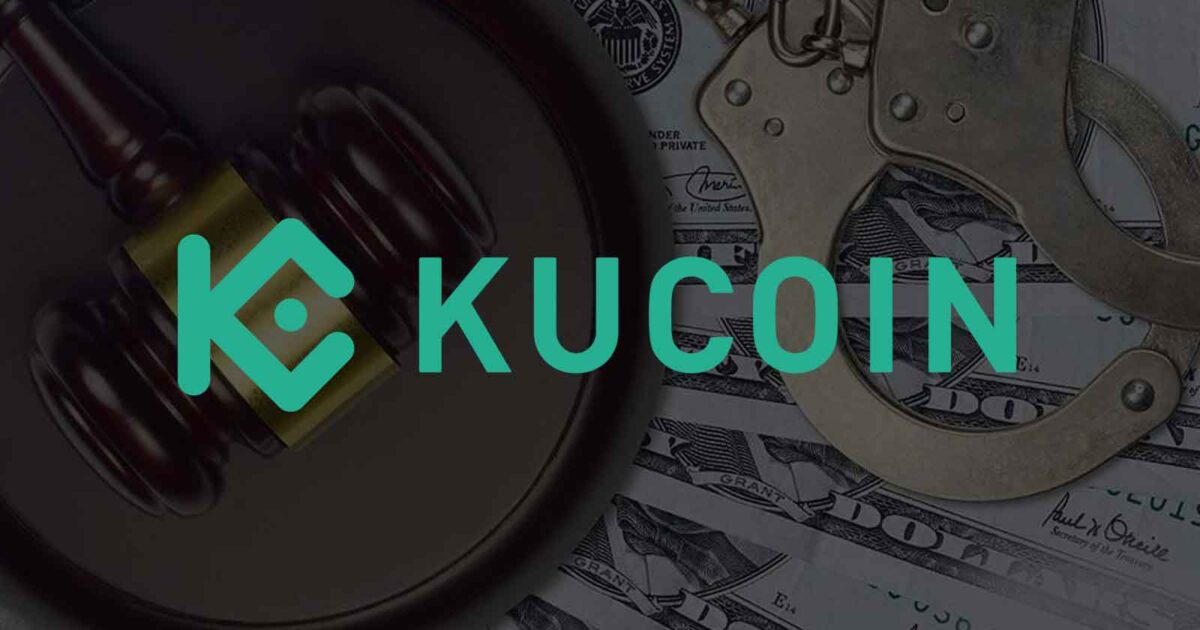
KuCoin exchange has been charged with violating anti-money laundering laws in the United States, under the Bank Secrecy Act. The charges were brought against the exchange and two of its founders by U.S. federal prosecutors.
They alleged that KuCoin, operating in the U.S., misled at least one investor about its operations and failed to register with U.S. government bodies or establish an anti-money laundering program.
According to the U.S. Department of Justice, KuCoin exchange, along with its founders Chun Gan and Ke Tang, ran the exchange as a money-transmitting business with over 30 million customers.
However, they did not implement a know-your-customer (KYC) or anti-money laundering (AML) program until 2023. Even after this, their KYC program did not cover existing customers. Gan and Tang were not arrested, as stated in a DOJ press release.
The indictment revealed that KuCoin exchange failed to register with the U.S. Financial Crimes Enforcement Network as a money services business. Due to the absence of KYC or AML programs, KuCoin exchange became susceptible to money laundering activities, including proceeds from illegal sources such as sanctions violations, darknet markets, and various fraudulent schemes.
The indictment also mentioned allegations that KuCoin indirectly received over $3.2 million worth of cryptocurrency from Tornado Cash, a sanctioned crypto mixer. KuCoin’s connection was emphasized in criminal filings against Alexey Pertsev and Roman Storm, the two developers of Tornado Cash.
Furthermore, the Commodity Futures Trading Commission (CFTC) filed a lawsuit against KuCoin exchange, accusing the company of failing to register as a futures commission merchant, swap execution facility, or designated contract market.
The CFTC also claimed that KuCoin exchange did not implement its equivalent of a KYC program. The CFTC seeks monetary penalties, trading and registration bans, and an injunction, while the DOJ seeks forfeiture along with criminal penalties.
Homeland Security Investigations Special Agent in Charge Darren McCormack characterized KuCoin exchange as “an alleged multibillion-dollar criminal conspiracy,” emphasizing its position as one of the largest cryptocurrency exchanges. U.S. Attorney Damien Williams stated that KuCoin actively concealed the fact that many U.S. users were trading on its platform.
He emphasized that KuCoin exchange became one of the world’s largest cryptocurrency exchanges, facilitating billions of dollars in daily trades and trillions of dollars in annual trade volume, while failing to implement basic anti-money laundering policies.
Following the announcement, KuCoin’s native token (KCS) dropped by 5%, and Bitcoin’s (BTC) price experienced a 1% drop, although it remained volatile throughout the day, trading around $70,000.
These actions follow closely after the Department of Justice (DOJ), Commodity Futures Trading Commission (CFTC), and Treasury Department resolved comparable allegations against Binance, the leading cryptocurrency exchange globally in terms of trading volume.
This wave of regulatory actions against KuCoin exchange follows recent efforts by authorities to tighten oversight on the cryptocurrency industry. Just months ago, the Department of Justice, Commodity Futures Trading Commission, and Treasury Department reached settlements with Binance, the world’s largest cryptocurrency exchange by trading volume, over similar charges.
The charges against KuCoin exchange highlight the growing scrutiny faced by cryptocurrency exchanges regarding their compliance with anti-money laundering and know-your-customer regulations. As digital assets gain more mainstream acceptance, regulators are increasingly focused on ensuring that these platforms adhere to the same standards as traditional financial institutions.
The outcome of these legal proceedings against KuCoin will likely have significant implications for the broader cryptocurrency ecosystem. It could prompt other exchanges to reassess their compliance practices and strengthen their anti-money laundering measures to avoid similar legal action in the future.
Moreover, the market reaction to these charges underscores the sensitivity of cryptocurrency prices to regulatory developments. The drop in KuCoin’s native token and Bitcoin’s price following the announcement demonstrates the impact that regulatory uncertainty can have on investor sentiment and market volatility.
As authorities continue to ramp up efforts to regulate the cryptocurrency industry, exchanges and market participants will need to navigate an increasingly complex regulatory landscape. Compliance with anti-money laundering and know-your-customer regulations will be crucial for ensuring the long-term viability and legitimacy of the cryptocurrency market.



